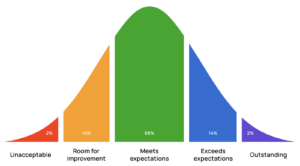There is a widely held believe belief along the lines of,
“Everyone used to have a private pension. The golden years were secured by a monthly check that allowed retirees to continue living just as they did when they were working. But, the corporate overlords hated the liability so they invented a system of retirement accounts that fails the average worker.”
Like most fairy tales, there are grains of truth in this account. Corporate America certainly has a long and sorted history of doing everything they could think of to avoid paying pensions. In addition, most workers near retirement report that they would prefer a pension to a retirement account. But that’s about where the similarities between the myth and the reality end.
Let’s start with the first sentence; “Everyone used to have a private pension.” This is simply nonsense. Morgan Housel makes the point most succinctly when he writes in his book The Psychology of Money
The Employee Benefit Research Institute explains: “Only a quarter of those age 65 or older had pension income in 1975.” Among that lucky minority, only 15% of household income came from a pension.
(Housel, Morgan. The Psychology of Money: Timeless lessons on wealth, greed, and happiness. Harriman House Limited, 2020.),
Much of the confusion comes from the fact that in the early 70’s roughly 80% of private sector employees worked with a company that offered a pension to SOMEONE on the payroll. If you worked there for 30 years, and never took a break, and retired at a high enough level and salary, then you would get some pension income. The rest of us were out of luck. The fact that someone on the payroll got a pension had nothing to do with the average worker except in rare circumstances such as public servants, railroad workers, and some areas with strong teachers or nurses unions.
A speaker in a famous documentary from 1972 entitled, “Pensions: The Broken Promise” (https://www.youtube.com/watch?v=Sjxidl8C_kU&t=9s) included what may be the best summary of the situation regarding pension income at the age of 65, at that time.
Today it’s almost a miracle if it’s there at age 65. You have to go to work for an employer. You have to stay with them. You have to stay in good health. You have to avoid layoffs. You have to take your money – turn it over to the employer, hope that he invests safely and soundly. You have to hope that when you’re age 65 the employer is still around, and he isn’t not likely to be in terms of the high mortality of business. So, there’s almost a sequence of miracles which you’re counting on.
Perhaps the speaker was being over-dramatic, but there is a point to be kept in mind here. Federal courts were filled in the early and mid 70’s with cases of employees suing employers that found ways to escape the pension obligations. Workers who would qualify for a pension after 20 years were laid off in year 19. Pensions promised after 30 years of service disappeared when firms filed bankruptcy in year 29 and so on.
Philosophically, I always thought about this a bit differently. The organization treats you in a fashion that makes you want to retire as soon as possible. They treat you this way when you have maximum value to them. You then think that they will treat you much better with a pension when you no longer have any value to them at all. Apparently, that makes sense to a lot of other people. It just never made much sense to me.
I profoundly AGREE that corporate America hated the liabilities of a pension system. Pensions were underfunded almost from the beginning. The capital in pension funds were always eyed with lust by any corporate raider looking for a weak firm to take over, break apart, and bankrupt or sell off the rest. One common trick was the employee retirement system buyout. In this arrangement the pension fund buys most, if not all of a failing company with the hopes that the management put in place by the new owners would turn the company around and keep it solvent. This almost never worked, and left the pension fund just as bankrupt as the rest of the dying firm. I have seen this happen in textile, furniture, and other industries where the American workforce could not compete with cheap foreign labor in the production of low-margin goods.
Finally, its not quite true that Corporate America invented a retirement system to get themselves off the hook, although there is some merit to this argument. In 1978, the IRS wrote Section 401 into the tax code. That code had a provision that limited how much money corporate executives could defer until after retirement. This happened because highly paid executives paid up to 70% marginal tax rates on incomes above $300,000. Many of them would prefer to defer much of this salary until after retirement to reduce the tax burden. The IRS noticed the scheme and wrote rules to limit this deferral to no more than $30,000. A benefit manager in Ohio named Theodore Benna saw the new regulation and noticed that this could be used to create retirement accounts for workers below the executive level. He created 50 such accounts for a small firm in 1980. Thus, the first 401-K accounts were born.
The tax code was not written for the creation of retirement accounts, and the corporations were vehemently opposed to the idea of having limits on how much could be deferred. Of course, they did quickly notice that the new arrangement did let them off the hook for the pensions, and a new system was born. I am going to argue later, that this was, without doubt, the best thing that ever happened to those who have retired since – – but that’s a post for another time.
The message for this post is simply this. The good old days when everyone had a pension, never existed, never were all that good and both side of the equation: the employees and the employers got away from it as soon as a new option appeared. So before you lobby to go back in time, look a little closer to see how wonderful that time actually was – or wasn’t!!!



